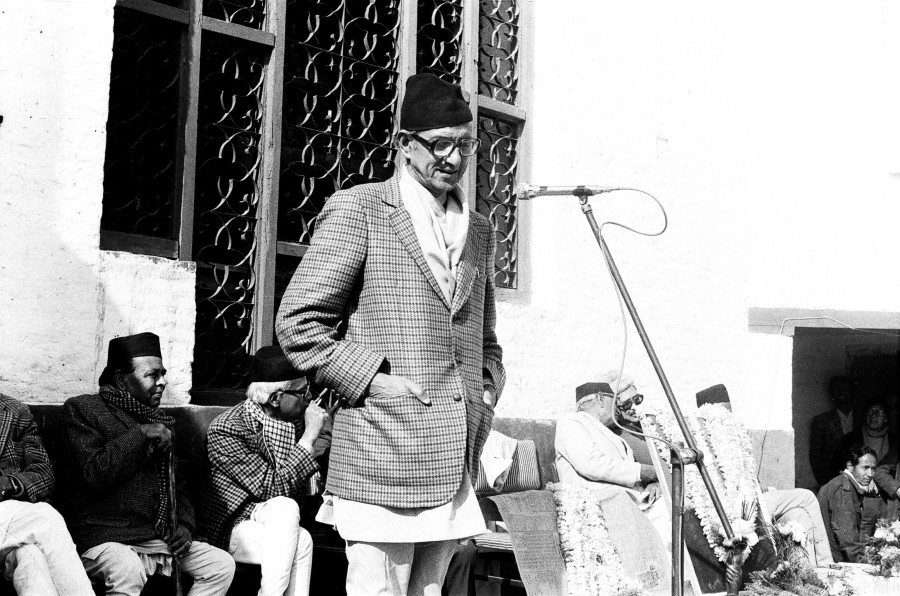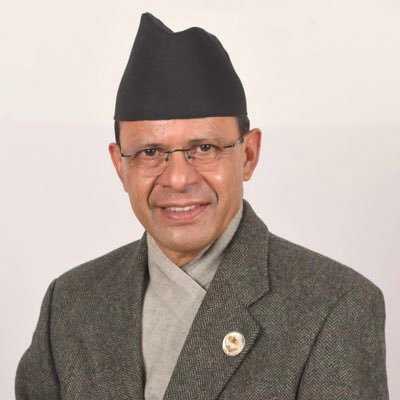Columns
BP through his friends’ looking glasses
BP could exhibit as much courage and character while fighting the monarchy, as when he espoused reconciliation.
Minendra Rijal
BP Koirala, or BP as he is popularly known across a broad political spectrum, is recognised as the most influential leader of modern Nepal. This week, we mark the completion of 40 years since his demise. His life, struggle and ideology continue to inspire millions beyond the Nepali Congress (NC), the party he founded, and its leaders. Nepalis across the political range admire him for his contribution to the process of nation building. The left respects him for his revolutionary defiance of the established social order and his socialist outlook on economic development. The right admires the reconciliatory position he took in the last decade of his life on the then prevailing, but now abolished, institution of monarchy.
To the benefit of those who do not read Nepali and have to depend largely on what is generally covered in English media, let me say a few words on BP. He led a successful democracy movement in 1950. This movement ended an overarching dynastic Rana rule that had kept the monarchy subdued and titular only for more than a century. As democracy was established and the monarchy was restored, BP as the leader of the democracy movement became the home minister and the incumbent Rana prime minister continued as the transitional prime minister. In conformity to an uncommon mutual safety feature that the government would be dissolved in the event if either the prime minister or the home minister was to resign, the transitional government was dissolved in less than a year when BP resigned from the office and in Matrika Prasad Koirala, who was president of the NC as well as BP’s elder brother, the nation got its first commoner prime minister.
First general election
Soon a political feud brewed between the prime minister and BP. NC did split and BP was pushed out of the position of power and influence. BP then started building his party and a democratic political movement from the grassroots up and was eventually successful in pressing a compromise that laid ground for the new constitutional arrangement to be backed up by the general election in 1959. The 1959 general elections saw Nepali Congress winning by a landslide and its leader BP, though with some unwarranted delay was appointed as the first democratically elected prime minister. But after 18 months of democratic rule, the then King dissolved the Parliament, and removed BP from office and imprisoned BP and many other leaders. After eight years of imprisonment in 1968, BP chose to go into self-exile and led an armed revolution to restore democracy. However, a number of events and considerations led BP to end his armed struggle and return to Nepal in 1976 with an appeal to the King for a national unity and reconciliation. His policy of reaching out to the King led the nation into a general referendum on “multi-party system vs party-less Panchayat system with timely reforms.” With the blessings of the King, the party-less side prevailed in the official result. BP continued, though in vain, to pursue the king for democratic reforms until his last days in 1982.
With this in background, now I am ready to talk about what I think his select colleagues saw in BP through their looking glass.
Suvarna Shumsher Rana, who was the most prominent person among his colleagues in the NC, served as finance minister in the Rana-NC cabinet of 1950 and became deputy prime minister in charge of finance in the BP-led elected government formed after the general election of 1959. After BP was imprisoned in 1961, Rana led an armed struggle against the king’s rule. A perceptive Rana later opted for a reconciliatory path with the king and also secured BP’s release in 1968. However, because of ensuing differences over the appropriateness of the strategy for the restoration of democracy, the two leaders went on to pursue their own ways with rival claims to the presidency of the NC for almost a decade. But as his health was failing, Rana grew anxious to hand over the NC presidency back to BP, which he did shortly before passing away. This is quite telling of his affection, camaraderie, admiration and respect for BP.
Ganesh Man Singh was the supreme leader of the democracy movement that put an end to the 30-year-long Panchayat rule and restored democracy in 1990. Singh and BP were probably the closest lifelong friends not just politically but in so many other ways. When Singh met BP for the first time in India, he tried to be careful not to do anything that would lead BP to believe that Singh would play second fiddle to him. In Singh’s own words, he always considered BP as his leader and supported him unwaveringly. Who else other than the man of iron will, determination and unmatched sense of self-deprecating humour that Singh had been, could have said that he had been to BP what Hanuman had been to Lord Ram in the great Hindu epic Ramayana? A more political and aptly reflecting of their political statures and friendship is how Singh penned his last words on BP in a succinct and most befitting formal write-up entitled “BP, my leader and my friend.”
I did not have a chance to personally observe the relationship between BP and his home minister Surya Prasad Upadhyay. The only time I saw them together was when Upadhyay was visiting BP after the latter had fallen ill with fatal lung cancer with not much time to live. There were enough reasons to believe that the two did not enjoy much of what one calls compassionate friendship as they had parted their political course for a long period since 1963. But as he walked out of BP’s room that day after wishing him all the best, Upadhyay’s eyes were visibly filled with tears and he could not hide that.
The simplest and yet the most determined of his colleagues, also a former prime minister KP Bhattarai, who was 10 years younger than BP and politically quite junior, and yet in a very atypical Nepali style, always addressed him just as BP. Bhattarai always introduced himself as the speaker of the dissolved House of Representatives. Even while he disagreed with BP’s ways, he had guts and courage to stand apart from BP and still oppose Panchayat rule. One morning during BP’s last days, Bhattarai got a small paper bag filled with beaten chickpeas, a personal delight of BP, and carried it along with him to BP. Upon reaching BP’s home, Bhattarai handed it over to BP’s very well-respected wife. But quite telling of his esteem for BP was when, asked by her to step inside his room, Bhattarai did not walk in but simply uttered that he had just come to pay his respects to his leader.
Vision for the nation
This list of BP’s closest colleagues will be incomplete without mentioning his youngest brother, the most devoted one among them, Girija Prasad Koirala, a very well-known leader and long-time prime minister of Nepal. Even when he had doubts about his older brother’s strategy and political stance, the younger Koirala thought BP had the right answers for every situation and was ready to forego anything he had as long as it did good for BP.
To close, I should state that BP had a vision for the nation. As important was the support, admiration and honour of these select and other illustrious colleagues, and the willingness of still many more to lay down their lives for the democratic cause he took up, that BP could exhibit as much courage and character while fighting the monarchy, as when he espoused reconciliation with it, is truly remarkable.




 11.12°C Kathmandu
11.12°C Kathmandu















